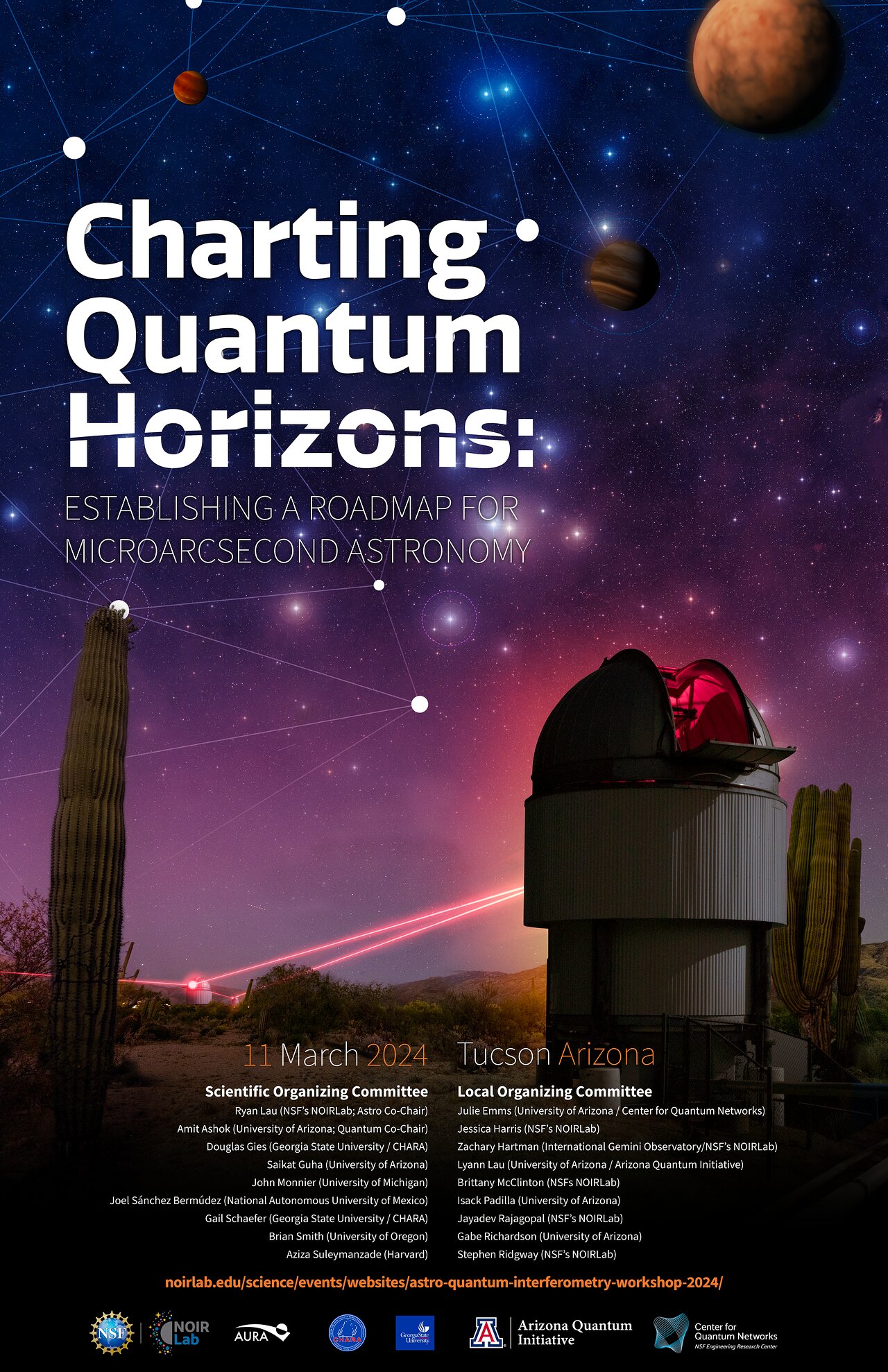Charting Quantum Horizons: Establishing a Roadmap for Microarcsecond Astronomy
** Jun 2024 Update**
A meeting report for the Charting Quantum Horizons workshop is now published in Nature Astronomy. We are also working on making the talks and recordings available on this website. Please stay tuned for updates.
-----------
Optical interferometry has undergone a revolution in the last few years that now brings into focus the future of this rapidly developing field. In particular, achieving baselines that exceed the current limitations of a few hundred meters would push new frontiers of microarcsecond science. Such capabilities would open up an entirely new phase space of high-resolution astronomical research that could lead to breakthroughs in fields such as exoplanets, stellar physics, young stars / disks, active galactic nuclei (AGN) and supermassive black holes (SMBHs).
Roadmaps for expanding baselines by several orders of magnitude over current optical imaging arrays are now being explored, where limitations due to photon loss can be addressed by quantum-enhanced methods utilizing resources such as quantum memories and entanglement. This is the ideal time to establish collaborations between the astronomy and quantum communities to ensure this opportunity for microarcsecond science can be realized. NSF’s NOIRLab, in collaboration with the Arizona Quantum Initiative (AQuI), the Center for Quantum Networks (CQN), and the Center for High Angular Resolution Astronomy (CHARA), will be hosting an in-person one-day workshop on 11 March 2024 on establishing the roadmaps for applying quantum-enhanced methods to optical/infrared interferometry at the Graduate Tucson Hotel.
After the Charting Quantum Horizons workshop, there will be the three-day Annual CHARA Science Meeting (March 12 - 14) at the same venue.
Timing: The workshop will last the whole day on Monday 11 March 2024 from 9 a.m. to about 5:00 p.m.
Workshop Goal:
The goal of this one-day workshop is to establish astronomy–quantum collaborations and to explore the roadmaps towards a new era of high-resolution astronomy. We aim to achieve this by accomplishing the following in the workshop:
- Review the current state of capabilities and techniques in optical/IR interferometry
- Highlight science cases enabled by microarcsecond resolution at optical/IR wavelengths (e.g. exoplanets, stellar physics, young stars/disks, AGN and SMBHs)
- Discuss quantum-enhanced methods for pushing current limitations on spatial resolution
- Establish collaborations between the astronomy and quantum communities to address science requirements and technical challenges
Another important goal following the workshop is for a collaboration of astronomers and quantum information scientists to write a joint white paper and/or publication that describes the concept of an on-sky demonstration of a quantum-enhanced telescope/interferometer.
** March 1, 2024 Update - Abstract submission and In-person Registration are now closed.**
** February 9, 2024 Update - In-person registration and contributed talk submissions are now closed. You may still register for remote attendance.**
** February 7, 2024 Update - Rooms at the Graduate Tucson Hotel can now be reserved under the per diem rate ($169/night) using the following link: CQH/CHARA 2024 Meeting Graduate Tucson Hotel Reservation Booking Link. The room reservation deadline is Feb 26.**
** January 22, 2024 Update - We have effectively reached the in-person capacity for the workshop. If you are registering for in-person attendance after Jan 22 12:00PM MST you will be placed on a waitlist.**
** January 12, 2024 Update - We are approaching capacity for in-person attendance, please register soon if you are planning to attend in person.**
Workshop email contact: astroquantum2024@noirlab.edu
Important Dates:
11 December: Registration and Abstract Submission Open9 February 2024: Contributed Talk Abstract Deadline (**Only a limited number of contributed talks may be selected**)9 February 2024: In-person Registration Deadline26 February 2024: Tucson Graduate Hotel Booking Deadline29 February 2024: Contributed Poster Abstract Deadline29 February 2024: Virtual Registration Deadline(Extended)- 11 March 2024: Workshop date
- 12–14 March 2024: CHARA Annual Science Meeting (Tucson, AZ)
Workshop Poster

